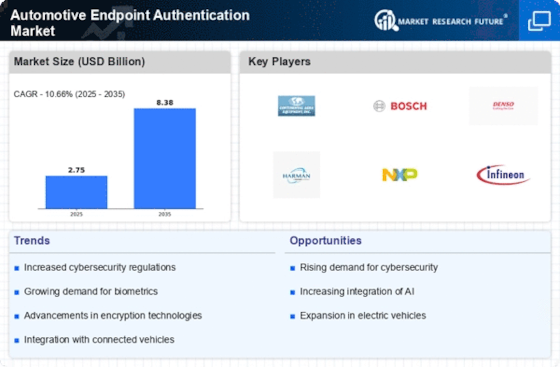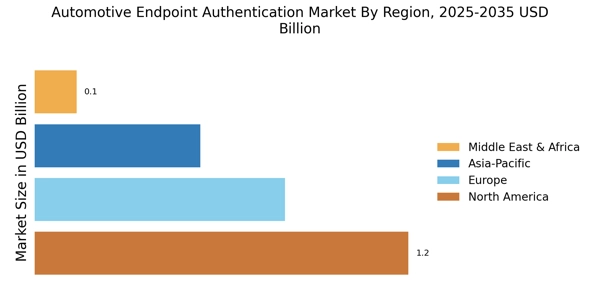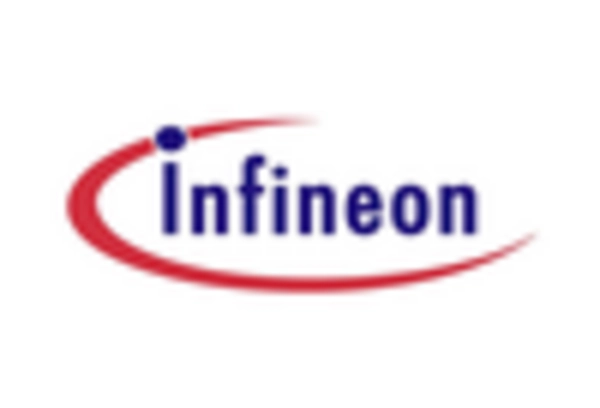Increase in Cybersecurity Threats
The rise in cybersecurity threats has become a pivotal driver for the Automotive Endpoint Authentication Market. As vehicles become increasingly connected, they are more susceptible to hacking and unauthorized access. This has led manufacturers to prioritize robust authentication mechanisms to safeguard sensitive data and ensure vehicle integrity. According to recent data, the automotive sector has witnessed a 30% increase in cyberattacks over the past year, prompting a shift towards advanced authentication solutions. Consequently, the demand for secure endpoint authentication systems is expected to surge, as stakeholders recognize the necessity of protecting both consumer information and vehicle functionality.
Advancements in Vehicle Connectivity
The rapid advancements in vehicle connectivity technologies are significantly influencing the Automotive Endpoint Authentication Market. With the proliferation of Internet of Things (IoT) devices in vehicles, the need for secure authentication methods has become paramount. As vehicles increasingly communicate with external networks, the potential for unauthorized access rises. Market data indicates that the connected car market is projected to reach USD 200 billion by 2025, highlighting the urgency for effective endpoint authentication solutions. This trend suggests that manufacturers are likely to invest heavily in authentication technologies to ensure secure communication channels, thereby driving market growth.
Consumer Demand for Enhanced Security Features
Consumer demand for enhanced security features is a crucial driver in the Automotive Endpoint Authentication Market. As awareness of cybersecurity risks grows, consumers are increasingly seeking vehicles equipped with advanced authentication systems. This shift in consumer behavior is reflected in market surveys, where over 70% of potential car buyers express a preference for vehicles with robust security features. Manufacturers are responding by integrating sophisticated authentication technologies, such as biometric systems and multi-factor authentication, into their offerings. This trend not only enhances consumer trust but also positions manufacturers competitively in a market that prioritizes safety and security.
Regulatory Pressures and Compliance Requirements
Regulatory pressures and compliance requirements are shaping the Automotive Endpoint Authentication Market. Governments and regulatory bodies are implementing stringent guidelines to ensure the security of connected vehicles. For instance, regulations mandating the implementation of cybersecurity measures in automotive systems are becoming more prevalent. This has led manufacturers to adopt comprehensive authentication solutions to comply with these regulations. Market analysis suggests that compliance-related investments in cybersecurity are expected to exceed USD 10 billion by 2026, indicating a strong correlation between regulatory frameworks and the growth of authentication technologies in the automotive sector.
Integration of Artificial Intelligence in Authentication Systems
The integration of artificial intelligence (AI) in authentication systems is emerging as a transformative driver in the Automotive Endpoint Authentication Market. AI technologies enable the development of adaptive authentication mechanisms that can learn and evolve based on user behavior. This capability enhances security by identifying anomalies and potential threats in real-time. Market forecasts indicate that the AI in the automotive sector is projected to grow at a CAGR of 25% over the next five years, underscoring the potential for AI-driven authentication solutions to revolutionize vehicle security. As manufacturers increasingly adopt AI technologies, the demand for sophisticated endpoint authentication systems is likely to rise.
















